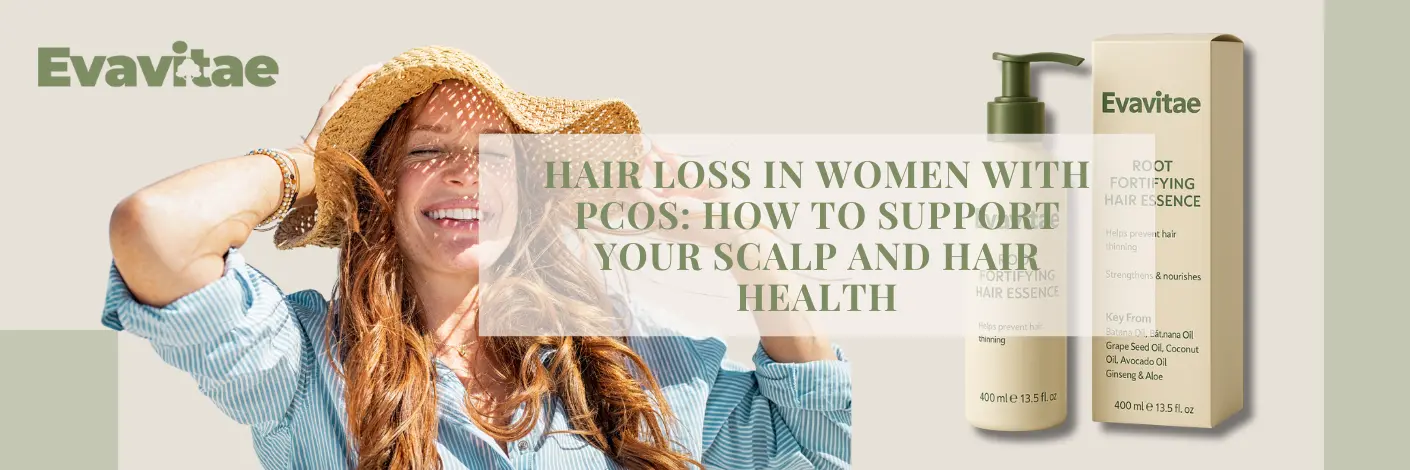
“Why does it feel like my hair is in on a secret plan to abandon me… all at once?”
That’s exactly what Maria whispered to herself one morning, staring at a small but growing collection of hair in her brush. She gently pulled her hair back into a ponytail—and paused. Was her part-line wider than last month?
Maria has PCOS (Polycystic Ovary Syndrome), a condition she’s been managing for a while. But no one told her that along with irregular cycles and occasional mood swings, her hair might decide to thin out just as she was starting to love her new haircut.
🎢 What’s going on with PCOS and hair loss?
Here’s the thing: not all hair loss is the same. Maria’s cousin Emily, for example, has naturally fine hair that sheds seasonally. Her colleague Amy recently had postpartum hair loss that resolved after a few months.
But PCOS-related hair loss is its own special club, and the secret handshake? Androgens—a.k.a. male hormones like testosterone and its sidekick, dihydrotestosterone (DHT).
In women with PCOS, elevated androgen levels can shrink hair follicles, especially around the scalp’s front and sides. This process, called miniaturization, leads to shorter, thinner hairs over time and is known as female-pattern hair loss (Mayo Clinic, 2022).
👉 The tricky part? While some women with PCOS may experience excess hair growth in places they don’t want it (chin, upper lip), they may also see hair thinning on their scalp where they’d like more of it.
Oh, the irony.
🔍 How PCOS hair loss differs from other types
- It’s gradual: PCOS hair thinning tends to happen slowly, not in sudden clumps.
- It targets specific areas: Usually near the temples and crown.
- It’s hormonally driven: Unlike shedding from stress or diet, PCOS hair loss stems from long-term androgen activity.
This means: shampoos alone won’t “fix” it—but good scalp care helps keep hair looking healthier, fuller, and stronger.
Excess oil and hormonal fluctuations can sometimes trigger scalp inflammation, making hair loss even more challenging. See our guide on caring for seborrheic dermatitis-related hair loss on sensitive scalps to find soothing, dermatologist-approved ways to calm irritation and protect your follicles.
💡 Maria’s humorous realization
Maria joked with her friend: “Honestly, at this point, my scalp deserves a spa day every day.”
So she set out on a quest—not for miracle cures—but for kind, daily rituals that supported her scalp without harsh chemicals or hormones.
🧴 Maria’s gentle care toolkit
1️⃣ A scalp-friendly shampoo
Her old shampoo was a fancy floral-scented one that, honestly, could double as perfume. But fragrances = potential irritation, and sulfates = too drying.
👉 Maria switched to Evavitae Anti-Hair Loss and Hair Growth Shampoo:
- Sulfate-free, fragrance-free, dermatologist-tested
- Gentle amino acid-based cleansers
- Enriched with biotin and panthenol for nourishment
Best of all? It didn’t leave her scalp feeling stripped or tight. No drama, no irritation—just a calm, clean head.
2️⃣ Lightweight hydration with a nourishing serum
Maria also added Evavitae Hair Renewal Serum to her routine:
- Lightweight oils like grape seed, argan, avocado, and batana
- Biotin and vitamin E for scalp support
- No synthetic fragrances or essential oils to worry about
She laughed that this serum was the closest thing her scalp would get to a daily green juice cleanse.
3️⃣ A few lifestyle tweaks that made a difference
Maria’s dermatologist reminded her: scalp health is an inside-out game too.
She didn’t need a massive overhaul but made small, sustainable changes:
- Eating iron-rich foods (spinach, red meat, beans)
- Prioritizing zinc and vitamin D
- Reducing heat styling—no more 400-degree straighteners on fragile new hairs!
She also learned that stress management matters for PCOS—a short evening walk with her dog Leo became her new favorite habit.
🎯 Summary table: Maria’s PCOS hair care cheat sheet
Concern | Gentle solution | Recommended product |
Dry, irritated scalp | Sulfate-free, fragrance-free shampoo | Evavitae Anti-Hair Loss Shampoo |
Fragile thinning hair | Lightweight hydrating serum | Evavitae Hair Renewal Serum |
Long-term support | Nutrient-dense diet, stress management | Iron, zinc, vitamin D foods |
🔎 FAQs Maria asked (so you don’t have to)
Hair follicles affected by DHT miniaturization won’t regrow on their own easily, but early care can slow progression and improve hair appearance.
Q: Should I use rosemary oil or “natural” DIY treatments?
Maria found that while rosemary oil is trendy, it’s not always safe for sensitive scalps and isn’t pregnancy-safe if that applies. Dermatologist-tested serums like Evavitae’s are a safer bet.
Q: Is this my fault?
Absolutely not! PCOS hair loss is hormonally driven—not caused by poor hair care or anything you did.
💛 What Maria learned (and now shares with everyone)
Maria realized her hair care didn’t need to be complicated or harsh.
In her words:
“I’m not trying to outsmart hormones—I’m supporting my scalp so whatever hair I have looks and feels its best.”
Gentle cleansing, soothing hydration, balanced nutrition, and a bit of humor—those became her secret weapons.
🌸 Keep building a healthy hair routine with step-by-step tips in our Scalp Care & Routine Hub.
Learn how to stop shedding and encourage growth naturally in our Postpartum Hair Regrowth Guide.
Evavitae products are now available exclusively at www.evavitae.com.




Add comment
You must be logged in to post a comment.